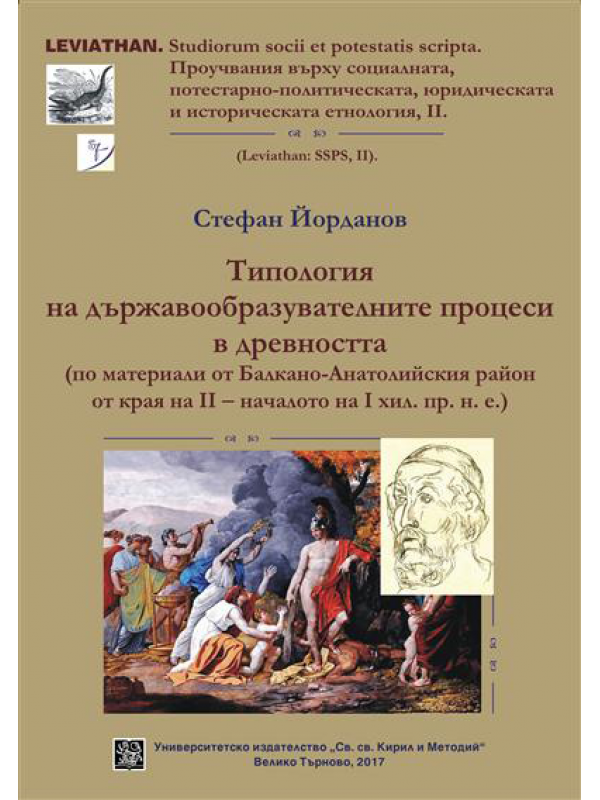Shopping Cart
0 item(s) - 0.00лв
Typology of the State Formation Processes in Antiquity
Typology of the State Formation Processes in Antiquity: According to the Data from the Balkan—Anatolian Region, the End of the 2nd — the Beginning of the 1st Millennium BC. Author: Stefan Yordanov. Language: Bulgarian with an extended summary in English
Table of contents
Въведение [Introduction]
Първа глава. Теоретико-методологически проблеми на изучаването на прехода към класово общество и държава. Постановка на въпроса
[Chapter one. Theoretical and methodological problems of the study of the transition to class society and state: Outline of the question]
I. 1. Предпоставки, механизъм и типология на процесите на преход към класово общество и държава [Factors, mechanism and typology of the processes of transition to class society and state]
I. 2. Типологията на прехода към класово общество и държава и проблемът за универсалността на понятието военна демокрация [The typology of the transition to class society and state and the problem of universality of the concept of military democracy]
I. 3. Бележки върху обществената организация и институционалната система на военната демокрация [Notes on the social organization and institutional system of the military democracy]
I. 4. Първобитната полово-възрастова организация на обществото и институционалната система на военната демокрация [The primitive age-set system of the society and the institutional system of the military democracy]
Втора глава. Балкано-Анатолийският район в края на II и началото на I хил. пр. н. е. — проблеми на историческото развитие и изворознанието [Chapter two. The Balkan-Anatolian region at the end of the 2nd and the beginning of the 1st Millennium BC: Problems of historical development and historical sources]
II. 1. Балкано-Анатолийският район в края на бронзовата епоха. Проблемът за приемствеността и ролята ѝ в държавообразувателните процеси [The Balkan-Anatolian region at the end of the Bronze age: The problem of continuity and its role in the state formation processes]
II. 2. Преглед на писмените източници за развитието на държавообразувателните процеси в Балкано-Анатолийския район [A review of the written sources elucidating the state formation processes in the Balkan-Anatolian region]
II. 3. Античната традиция като източник за изучаване на държавообразувателните процеси. Трансформация на митичната история в античната литература и наука [The ancient mytho-epic tradition as a source of study of the state formation processes: Transformation of mythical history within the frame of classical literature and science]
II. 4. Митология и история. Митологията като реликтова социална нормативност [Mythology and history: Mythology as a relictual social normativity]
Трета глава. Типология на прехода към класово общество и държава в Балкано-Анатолийския район по писмени данни от I хил. пр. н.е. [Chapter three. Typology of the transition to class society and state in the Balkan-Anatolian region according to the written data from the 1st Millennium BC]
III. 1. Митологемите „принц—чужденец“, „цар—роб“ и подобни. Специфика на архаичната царска институция от митологичните повествувания [The mythologems “stranger-prince”, “slave-king” and their like: Specific character of the archaic regal institution from the mythological narrations]
III. 2. Митологемите „принц—чужденец“, „цар—роб“ и подобни (продължение)
III. 3. Военна демокрация и митологичният модел на обществените отношения в миналото: митологичните ценностни изпитания, „гинекократични“ бракове и матрилинейно престолонаследие като реликти от единна институционална система [Military democracy and the mythological model of social relations in the past: The mythological trials of values, gynaecocratic marriages and matrilogical succession to the throne as relics of an integral institutional system]
Четвърта глава. Възрастовата стратификация в обществената организация на народите от Балкано-Анатолийския район (края на II — началото на I хил. пр. н. е.) [Military democracy and the mythological model of social relations in the past: The mythological trials of values, gynaecocratic marriages and matrilogical succession to the throne as relics of an integral institutional system]
IV. 1. Система на управление в обществената организация на митологичните царства от Балкано-Анатолийския район [A system of government in the social organization of the mythological kingdoms of the Balkan-Anatolian region]
IV. 2. Възрастовата организация в системата на обществено управление в историята на Балкано-Анатолийския район от II — I хил. пр. н. е. [The age-set organization in the system of social government in the 2nd—1st Millennium BC Balkan-Anatolian region (The Achaeans χάρη κόμοωντες, the Abantes όπισθεν κόμοωντες, the Thracians ακροκόμοι)]
IV. 3. Преходът към класово общество и типологията на фигурата на т.нар. цар-жрец. Опит за синтез [The transition to class society and the typology of the figures of the so called priest-king: An attempt at synthesis]
Заключение [Conclusions]
Библиография [Bibliography]
I. Съкращения
II. Публикации на автора по проблематиката
III. Цитирана литература
А. Кирилица
Б. Латиница
Summary in English
| Details | |
| Publisher | St. Cyril and St. Methodius University of Veliko Turnovo |
| Language | Bulgarian with a summary in English |
| Pages | 288 |
| Illustrations | b/w figures |
| Binding | paperback |
| ISBN | 978-619-208-115-7 |
| Creation date | 2017 |
| Size | 16 x 24 cm |
Write a review
Your Name:Your Review: Note: HTML is not translated!
Rating: Bad Good
Enter the code in the box below:









